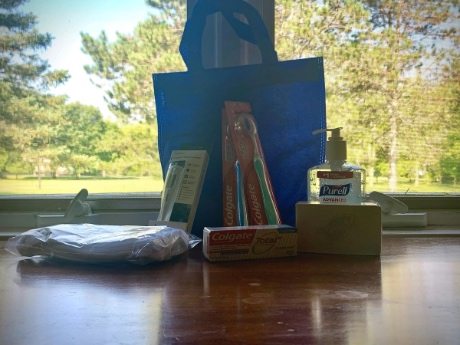Press release:
Washington, D.C. – President Donald J. Trump and U.S. Secretary of Agriculture Sonny Perdue today announced up to an additional $14 billion dollars for agricultural producers who continue to face market disruptions and associated costs because of COVID-19.
Signup for the Coronavirus Food Assistance Program (CFAP 2) will begin Sept. 21st and run through Dec. 11.
“America’s agriculture communities are resilient, but still face many challenges due to the COVID-19 pandemic. President Trump is once again demonstrating his commitment to ensure America’s farmers and ranchers remain in business to produce the food, fuel, and fiber America needs to thrive,” Secretary Perdue said. “We listened to feedback received from farmers, ranchers and agricultural organizations about the impact of the pandemic on our nations’ farms and ranches, and we developed a program to better meet the needs of those impacted.”
Background:
The U.S. Department of Agriculture (USDA) will use funds being made available from the Commodity Credit Corporation (CCC) Charter Act and CARES Act to support row crops, livestock, specialty crops, dairy, aquaculture and many additional commodities. USDA has incorporated improvements in CFAP 2 based from stakeholder engagement and public feedback to better meet the needs of impacted farmers and ranchers.
Producers can apply for CFAP 2 at USDA’s Farm Service Agency (FSA) county offices. This program provides financial assistance that gives producers the ability to absorb increased marketing costs associated with the COVID-19 pandemic. Producers will be compensated for ongoing market disruptions and assisted with the associated marketing costs.
CFAP 2 payments will be made for three categories of commodities – Price Trigger Commodities, Flat-rate Crops and Sales Commodities.
Price Trigger Commodities
Price trigger commodities are major commodities that meet a minimum 5-percent price decline over a specified period of time. Eligible price trigger crops include barley, corn, sorghum, soybeans, sunflowers, upland cotton, and all classes of wheat. Payments will be based on 2020 planted acres of the crop, excluding prevented planting and experimental acres. Payments for price trigger crops will be the greater of: 1) the eligible acres multiplied by a payment rate of $15 per acre; or 2) the eligible acres multiplied by a nationwide crop marketing percentage, multiplied by a crop-specific payment rate, and then by the producer’s weighted 2020 Actual Production History (APH) approved yield. If the APH is not available, 85 percent of the 2019 Agriculture Risk Coverage-County Option (ARC-CO) benchmark yield for that crop will be used.
For broilers and eggs, payments will be based on 75 percent of the producers’ 2019 production.
Dairy (cow’s milk) payments will be based on actual milk production from April 1 to Aug. 31. The milk production for Sept. 1 to Dec. 31 will be estimated by FSA.
Eligible beef cattle, hogs and pigs, and lambs and sheep payments will be based on the maximum owned inventory of eligible livestock, excluding breeding stock, on a date selected by the producer, between Apr. 16 and Aug. 31.
Flat-rate Crops
Crops that either do not meet the 5-percent price decline trigger or do not have data available to calculate a price change will have payments calculated based on eligible 2020 acres multiplied by $15 per acre. These crops include alfalfa, extra long staple (ELS) cotton, oats, peanuts, rice, hemp, millet, mustard, safflower, sesame, triticale, rapeseed, and several others.
Sales Commodities
Sales commodities include specialty crops; aquaculture; nursery crops and floriculture; other commodities not included in the price trigger and flat-rate categories, including tobacco; goat milk; mink (including pelts); mohair; wool; and other livestock (excluding breeding stock) not included under the price trigger category that were grown for food, fiber, fur or feathers. Payment calculations will use a sales-based approach, where producers are paid based on five payment gradations associated with their 2019 sales.
Additional commodities are eligible in CFAP 2 that weren’t eligible in the first iteration of the program. If your agricultural operation has been impacted by the pandemic since April, we encourage you to apply for CFAP 2. A complete list of eligible commodities, payment rates and calculations can be found on farmers.gov/cfap.
Eligibility
There is a payment limitation of $250,000 per person or entity for all commodities combined. Applicants who are corporations, limited liability companies, limited partnerships may qualify for additional payment limits when members actively provide personal labor or personal management for the farming operation. In addition, this special payment limitation provision has been expanded to include trusts and estates for both CFAP 1 and 2.
Producers will also have to certify they meet the Adjusted Gross Income limitation of $900,000 unless at least 75 percent or more of their income is derived from farming, ranching or forestry-related activities. Producers must also be in compliance with Highly Erodible Land and Wetland Conservation provisions.
Applying for Assistance
Producers can apply for assistance beginning Sept. 21. Applications will be accepted through Dec. 11.
Additional information and application forms can be found at farmers.gov/cfap. Documentation to support the producer’s application and certification may be requested. All other eligibility forms, such as those related to adjusted gross income and payment information, can be downloaded from farmers.gov/cfap/apply. For existing FSA customers, including those who participated in CFAP 1, many documents are likely already on file. Producers should check with FSA county office to see if any of the forms need to be updated.
Customers seeking one-on-one support with the CFAP 2 application process can call (877) 508-8364 to speak directly with a USDA employee ready to offer assistance. This is a recommended first step before a producer engages with the team at the FSA county office.
All USDA Service Centers are open for business, including some that are open to visitors to conduct business in person by appointment only. All Service Center visitors wishing to conduct business with FSA, Natural Resources Conservation Service or any other Service Center agency should call ahead and schedule an appointment.
Service Centers that are open for appointments will pre-screen visitors based on health concerns or recent travel, and visitors must adhere to social distancing guidelines.
Visitors are also required to wear a face covering during their appointment. Our program delivery staff will be in the office, and they will be working with our producers in the office, by phone and using online tools. More information can be found at farmers.gov/coronavirus.





